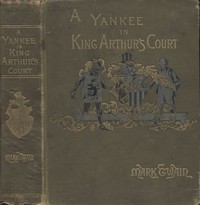A Connecticut Yankee in King Arthur's Court by Mark Twain (the red fox clan .TXT) 📕

Read free book «A Connecticut Yankee in King Arthur's Court by Mark Twain (the red fox clan .TXT) 📕» - read online or download for free at americanlibrarybooks.com
- Author: Mark Twain
Read book online «A Connecticut Yankee in King Arthur's Court by Mark Twain (the red fox clan .TXT) 📕». Author - Mark Twain
Sir Launcelot met up with old King
Agrivance of Ireland unexpectedly last
weok over on the moor south of Sir
Balmoral le Merveilleuse’s hog dasture.
The widow has been notified.
Expedition No. 3 will start adout the
first of mext month on a search f8r Sir
Sagramour le Desirous. It is in com-
and of the renowned Knight of the Red
Lawns, assissted by Sir Persant of Inde,
who is compete9t. intelligent, courte-
ous, and in every way a brick, and fur-
tHer assisted by Sir Palamides the Sara-
cen, who is no huckleberry hinself.
This is no pic-nic, these boys mean
busine&s.
The readers of the Hosannah will re-
gret to learn that the hadndsome and
popular Sir Charolais of Gaul, who dur-
ing his four weeks’ stay at the Bull and
Halibut, this city, has won every heart
by his polished manners and elegant
cPnversation, will pUll out to-day for
home. Give us another call, Charley!
The bdsiness end of the funeral of
the late Sir Dalliance the duke’s son of
Cornwall, killed in an encounter with
the Giant of the Knotted Bludgeon last
Tuesday on the borders of the Plain of
Enchantment was in the hands of the
ever affable and efficient Mumble,
prince of un3ertakers, then whom there
exists none by whom it were a more
satisfying pleasure to have the last sad
offices performed. Give him a trial.
The cordial thanks of the Hosannah
office are due, from editor down to
devil, to the ever courteous and thought-
ful Lord High Stew d of the Palace’s
Third Assistant V t for several sau-
ceTs of ice crEam a quality calculated
to make the ey of the recipients hu-
mid with grt ude; and it done it.
When this administration wants to
chalk up a desirable name for early
promotion, the Hosannah would like a
chance to sudgest.
The Demoiselle Irene Dewlap, of
South Astolat, is visiting her uncle, the
popular host of the Cattlemen’s Board-
ing Ho&se, Liver Lane, this city.
Young Barker the bellows-mender is
hoMe again, and looks much improved
by his vacation round-up among the out-
lying smithies. See his ad.
Of course it was good enough journalism for a beginning; I knew that quite well, and yet it was somehow disappointing. The “Court Circular” pleased me better; indeed, its simple and dignified respectfulness was a distinct refreshment to me after all those disgraceful familiarities. But even it could have been improved. Do what one may, there is no getting an air of variety into a court circular, I acknowledge that. There is a profound monotonousness about its facts that baffles and defeats one’s sincerest efforts to make them sparkle and enthuse. The best way to manage—in fact, the only sensible way—is to disguise repetitiousness of fact under variety of form: skin your fact each time and lay on a new cuticle of words. It deceives the eye; you think it is a new fact; it gives you the idea that the court is carrying on like everything; this excites you, and you drain the whole column, with a good appetite, and perhaps never notice that it’s a barrel of soup made out of a single bean. Clarence’s way was good, it was simple, it was dignified, it was direct and business-like; all I say is, it was not the best way:
However, take the paper by and large, I was vastly pleased with it. Little crudities of a mechanical sort were observable here and there, but there were not enough of them to amount to anything, and it was good enough Arkansas proof-reading, anyhow, and better than was needed in Arthur’s day and realm. As a rule, the grammar was leaky and the construction more or less lame; but I did not much mind these things. They are common defects of my own, and one mustn’t criticise other people on grounds where he can’t stand perpendicular himself.
I was hungry enough for literature to want to take down the whole paper at this one meal, but I got only a few bites, and then had to postpone, because the monks around me besieged me so with eager questions: What is this curious thing? What is it for? Is it a handkerchief?—saddle blanket?—part of a shirt? What is it made of? How thin it is, and how dainty and frail; and how it rattles. Will it wear, do you think, and won’t the rain injure it? Is it writing that appears on it, or is it only ornamentation? They suspected it was writing, because those among them who knew how to read Latin and had a smattering of Greek, recognized some of the letters, but they could make nothing out of the result as a whole. I put my information in the simplest form I could:
“It is a public journal; I will explain what that is, another time. It is not cloth, it is made of paper; some time I will explain what paper is. The lines on it are reading matter; and not written by hand, but printed; by and by I will explain what printing is. A thousand of these sheets have been made, all exactly like this, in every minute detail—they can’t be told apart.” Then they all broke out with exclamations of surprise and admiration:
“A thousand! Verily a mighty work—a year’s work for many men.”
“No—merely a day’s work for a man and a boy.”
They crossed themselves, and whiffed out a protective prayer or two.
“Ah-h—a miracle, a wonder! Dark work of enchantment.”
I let it go at that. Then I read in a low voice, to as many as could crowd their shaven heads within hearing distance, part of the account of the miracle of the restoration of the well, and was accompanied by





Comments (0)